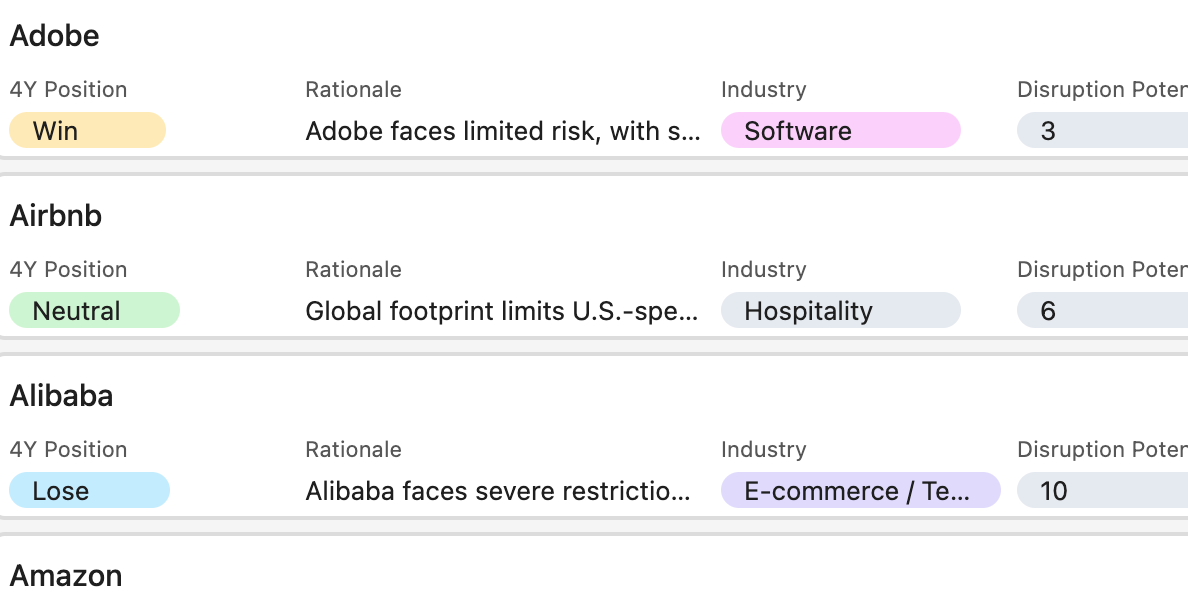C_NCENTRATE
IN THIS ISSUE: The next four years in tech, 'Impact Printing', Ozempic secondary effects, The Beatles, and smart lollipops...
THIS ISSUE OF C_NCENTRATE IS SPONSORED BY:
TBD+ — the global intelligence collective that’s your gateway to exclusive events, a vast content repository, a powerful network, job opportunities, and more.
Explore what’s next: members.tbdpl.us.
/// Play this ↓
Curated with neuroscientists, ’Focus’ is the official C_NCENTRATE playlist that aids your encoding and recall. Play as is, or hit shuffle.
/// Read these ↓
Is your businesses about to get hit by an Ozempic shockwave? /6 mins
↑ Japan is planning a ‘conveyor belt road’ linking Tokyo and Osaka amid delivery driver shortage. /4 mins
‘Impact printing’ is a cement-free alternative to 3D-printed structures. /7 mins
Scientists have developed a fast, affordable cancer test from a single drop of blood. /5 mins
There’s now a Google Map just for VCs. /1 min
The Beatles song, restored by AI, is up for a Grammy. /5 mins
↑ The Smart Lollipop is a cancer/allergy/diabetes lab on a stick. /3 mins
How to answer the ‘why should we hire you?’ question. /5 mins
↑ Artwork by Ai Da, an ‘ultra-realistic’ robot, has sold for £1.3m. /7 mins
Who tells the satellites where to take pictures is changing. /4 mins
WHAT THE NEXT FOUR YEARS REALLY HOLDS FOR BIG TECH
The coming presidential term promises anything but smooth sailing for big tech. While a few players will benefit from new growth-oriented policies, most will have to contend with intensified restrictions, personal grievances, and heightened security pressures. Let’s have a reality check: Trump, at 78, is the oldest, and first felon, president in history, and signs of cognitive decline are evident. The odds of him completing the term unscathed aren’t high, and a third isn’t possible. Therefore, the real issue perhaps lies in the intentions (and allegiances) of key figures like J.D. Vance, Elon Musk, and Peter Thiel. Their agendas—not Trump’s longevity—are the true forces shaping the tech landscape, and their motivations will steer policy in ways that go far beyond traditional conservative playbooks for generations. Each has history, and motivations that are deep, shaping not just the immediate tech landscape but potentially embedding a legacy that outlasts any single term. In this new era, the agendas of these power players—rather than Trump himself—will carve the future of tech, setting precedents with consequences that reach far beyond traditional political cycles.
Here’s how the big issues over the next four years look to shift, and for a detailed analysis on how each platform will fair, check out this table in TBD+.
Trump’s AI stance will likely dismantle Biden’s focus on bias reduction, with Elon Musk pushing a softer regulatory approach that keeps some safety rules intact. In cryptocurrency, Trump’s growth-oriented shift would ease Biden-era scam protections, likely inviting more speculative actors, while a pressured SEC could see leadership changes more sympathetic to market expansion.
On China, Trump will escalate Biden’s restrictions, focusing on tech and AI export controls, tariffs, sanctions on key sectors, and reshoring to limit China’s influence, potentially urging allies to adopt similar measures. Section 230 could shift as Trump considers immunity’s advantages for platforms like Truth Social and X.
Antitrust efforts may become more personalised, with selective probes against critics like Amazon and Google, while potentially favouring platforms supportive of Trump. Meanwhile, TikTok faces heightened scrutiny as part of a broader China crackdown, likely intensifying its divestiture process.
SO WHAT?
Trump’s approach will mix deregulation with tactical enforcement, targeting growth in certain sectors while pushing back against adversarial tech players. The big tech mantra (and a lot more people’s) over the next four years may be the Antonio Gramsci quote; “Pessimism of the intellect, optimism of the will.”, See the world how it really is, and forge ahead with tenacity.
DO: Double down on first-party data. Platform rules are a moving target, and those who own their customer insights hold the cards. Set up systems—whether through loyalty schemes, direct channels, or sharpened CRM tactics—that give you control over customer data without relying on third-party platforms. Should privacy policies and API access tighten up, you’ll be in the best position possible.
DON’T: Put all your eggs in one basket. Ensure you are regularly looking at where your strategy is taking you. Future-proof your digital assets by choosing modular solutions that can jump platforms as needed, so you’re ready for anything—whether it’s antitrust shake-ups, throttled data pipelines, or API restrictions. The goal: freedom to pivot, no matter how the Big Tech chessboard is re-arranged.
/// Bookmark these ↓
- Tech Policy Press (Independent) - tech regulation, accountability, and privacy.
- AlgorithmWatch (Research) – AI ethics, algorithm accountability and transparency.
- Data & Society (Research) – Research and policy for the public interest.
- Noahpinion (Independent) – Economics, tech innovation, technology.
/// Answer this ↓
LAST WEEK’S RESULTS:
Q: “Big Tech’s control over AI infrastructure is a/an ______.”
A: The PR machines seem to be winning: 33% said overblown, while 25% said necessary innovation, and another 25% said dangerous monopoly.
/// Apply for these ↓
Senior Associate, AI Governance, The Future Society (Remote, US/$104-$113k)
Director, Chief Product and Experience Officer Office, The Pokémon Company International (London, UK/£111k–£167k per year)
Senior Machine Learning Engineer, AI Research, Anthropic (Remote/$200k–$370k)
Senior Adviser, Advocacy and Comms, Policy, Centre for Long-Term Resilience (London, UK/£80-90k)
Content Strategist, Confidential E-commerce Brand (Remote, UK/£33k–50k)
/// C_NCENTRATE is written by Paul Armstrong
Paul delivers actionable insights that keep companies ahead of disruption. As the founder of TBD Group and author of Disruptive Technologies, Paul is a trusted expert for global brands, agencies, and when breaking news hits media giants like FT, WSJ, BBC, and CNN call him.
Paul is booking speaking engagements for 2025 now. Connect on LinkedIn, or email him.
Before you go: Cuddle up with this.







